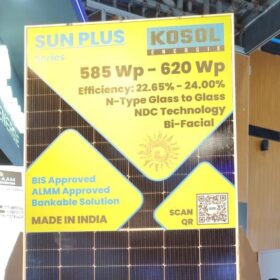Azure Power Global Limited, one of the largest independent solar power producers in India, has announced its consolidated results under United States Generally Accepted Accounting Principles (“GAAP”) for the third quarter ended December 31, 2017.
The company’s operating and committed megawatts has increased from 509 MW to 1,580 MW compared to last year December. The new 250 MW project won in October 2017 with NTPC Vidyut Vyapar Nigam (NVVN), has brought the capacity to 1,830 MW. Therefore, because of that the company’s electricity generation during the nine months until end of December has increased by 438 million kWh, or 105%, to 855 million kWh. Moreover, the total revenue during the same nine months was INR 5,441.6 million ($85.3 million), up 90% from INR 2,865.4 million ($44.5 million) during the same period in 2016.
Effect of new PPAs and falling tariffs
The use of higher-cost domestic modules as required by the Power Purchase agreement (PPA) and purchased land leads to higher project cost/MW. Project cost per megawatt operating, consists of costs incurred for one megawatt of new solar power plant capacity during the reporting period, has increased by INR 8.7 million ($0.14 million) to INR 52.9 million ($0.83 million), as compared to the same period in 2016.
The falling benchmark tariffs and reduction in solar module prices has significant impact on nominal contracted payments, and portfolio run-rate. Portfolio run-rate increased by INR 2,958.7 million ($46.4 million) to INR 14,007.9 million ($219.5 million) as of December 31, 2017, as compared to December 31, 2016, due to an increase in operational and committed capacity.
Fiscal 2017 and 2018 third quarter comparison
Operating revenue was INR 1,739.9 million ($27.3 million), an increase of 83% from INR 948.8 million. Cost of operations has increased by 90% to INR 158.4 million ($ 2.5 million) from INR 83.2 million. The increase was primarily due to plant maintenance cost for newly commissioned projects, which was partially offset by the implementation of improved O&M methods which improved plant productivity. This includes INR 8.7 million ($ 0.1 million) of non-cash expense, which pertains to the amortization of lease expense.
Net loss was recorded INR 136.1 million ($2.1 million), as compared to a net loss of INR 514.3 million for the quarter ended December 31, 2016, a decrease in loss of INR 378.1 million ($5.9 million). This was primarily due to an increase in revenue during the third quarter ended December 31, 2017, compared to the same period in 2016.
Cash Generations and Earnings
Due to increase in revenue, the cash generated from operating activities and financing activities are INR 405.5 million ($6.4 million) and INR 16,757 ($262.5 million) respectively, which is INR 181.8 million ($2.8 million) higher and INR 425.9 million ($6.61 million) lesser than in first nine months of year 2016. However, the company invested more cash due to purchases of property plant and equipment for new projects as compared to the fiscal 2017 third quarter.
During the nine months ended December 31, 2017, the company raised INR 42,712 million ($669.2 million) of non-convertible debentures and project debt, including green bonds.
Adjusted Earnings before interest, tax, depreciation and amortization (EBITDA) was INR 1,226.9 million ($19.2 million) for the third quarter 2018 fiscal, which is an increase of 176% compared to fiscal 2017 third quarter.
Azure Power mentioned that the Uttar Pradesh 40 MW and Andhra Pradesh 50 MW projects are expected to be materially complete by fiscal year end 2018. However, the government provided transmission interconnections are likely to roll over into the next fiscal year.
Therefore, the company expects that 905 – 1,000 MW will be operational by March 31, 2018, based on current expectations and revenues for the fiscal year 2018 ending March 31, of $118 – 125 million.
For the next fiscal ended March 31, 2019, Azure Power expects to have 1,300 – 1,400 MW operational, or a 30-55% year on year increase, and revenues of between $143 – 151 million.
This content is protected by copyright and may not be reused. If you want to cooperate with us and would like to reuse some of our content, please contact: editors@pv-magazine.com.








By submitting this form you agree to pv magazine using your data for the purposes of publishing your comment.
Your personal data will only be disclosed or otherwise transmitted to third parties for the purposes of spam filtering or if this is necessary for technical maintenance of the website. Any other transfer to third parties will not take place unless this is justified on the basis of applicable data protection regulations or if pv magazine is legally obliged to do so.
You may revoke this consent at any time with effect for the future, in which case your personal data will be deleted immediately. Otherwise, your data will be deleted if pv magazine has processed your request or the purpose of data storage is fulfilled.
Further information on data privacy can be found in our Data Protection Policy.